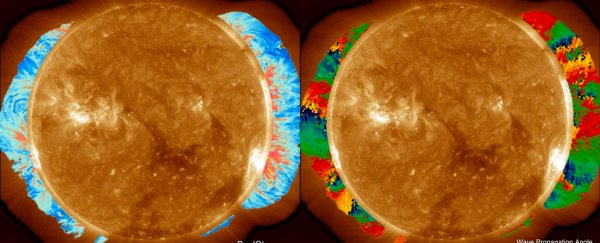The Sun's corona, its outer atmosphere of searing hot plasma, is a source of constant fascination for scientists – and in a major leap forward in our understanding, researchers have mapped out a region of its global magnetic field for the first time.
This magnetic field helps to drive and control many aspects of the Sun's behaviour, from the way the plasma around the Sun is heated to extreme temperatures, to the giant solar eruptions that can impact life here on Earth.
The new measurements should give scientists some extra insight into these events, and a better understanding of the 11-year solar cycle that's dictated by the flipping of the star's magnetic field.
 The newly measured magnetic field. (School of Earth and Space Sciences, Peking University)
The newly measured magnetic field. (School of Earth and Space Sciences, Peking University)
The team used the Coronal Multi-channel Polarimeter (or CoMP) instrument at the Mauna Loa Solar Observatory in Hawaii to track the progress of Alfvén waves – magnetic waves that act as indicators of the underlying magnetic field, changing in speed as the magnetic field changes in strength.
"The data that is collected from CoMP reveals the Sun's corona is full of these Alfvén waves and provides us with the best available view of them," says solar physicist Richard Morton from Northumbria University in the UK.
Up until now, scientists have only been able to get regular, accurate measurements of the solar magnetic field at the photospheric level, or the solar surface. This new research extends that all the way out to the upper solar atmosphere, the corona.
It's a much more complete picture of the Sun's magnetic field, in other words, as charted by observations of these Alfvén waves. It fills in gaps in our scientific knowledge about how the layers of atmosphere around the Sun interact with each other.
"I think that this is a wonderful demonstration of how we can exploit the Alfvén waves to probe the properties of the Sun," says Morton. "The process is similar to how seismologists use earthquakes to find out what the interior of the Earth looks like."

A map of the coronal magnetic field strength (left) and direction (right). (School of Earth and Space Sciences, Peking University)
To put the final touches to the measurements, the wave data was combined with information about the electron density of the corona to build up a much fuller picture of the Sun's magnetic field than we've ever had before.
There's still plenty that we don't know for sure about how the Sun – such as why the corona is so much hotter than the surface, for a start – but little by little, from observations of the Sun and experiments here on Earth, we're learning more.
The team also says this is just the beginning: the same techniques they've used to make these initial measurements could be applied on a regular basis to build up a constantly updated picture of how the corona's magnetic field is working.
"The method could potentially be used to produce routine magnetic field maps for the corona that are similar to those already available for the Sun's surface," write the researchers in their paper.
The research has been published in Science.
